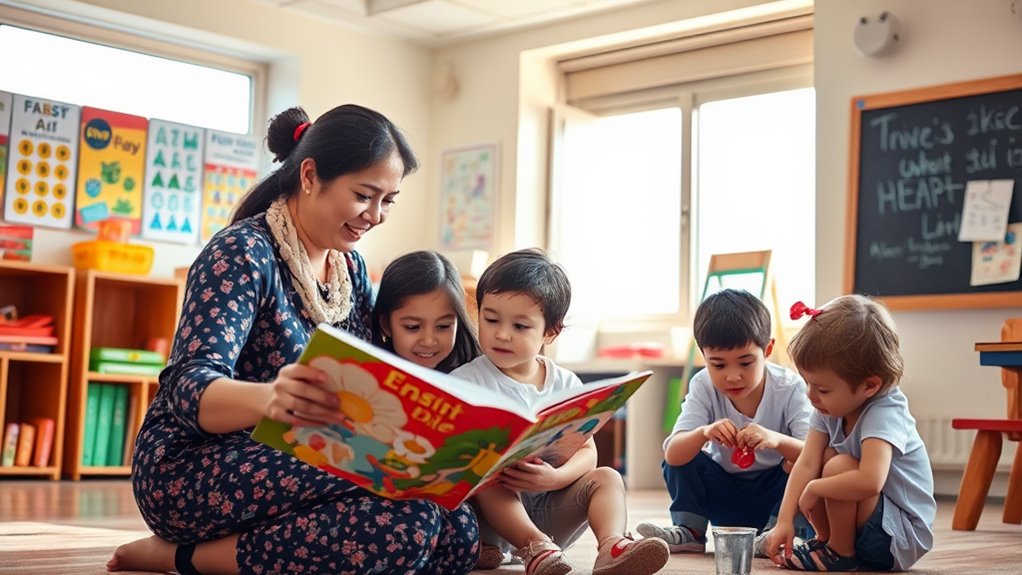The Amazing Benefits of Combining Parenting and Education Strategies
Combining parenting with educational strategies can transform your child’s development. By creating a supportive home environment, you foster emotional resilience and academic success. Engaging in regular communication about emotions helps build strong coping mechanisms. You also play a crucial role in enhancing their academic performance by nurturing a growth mindset and encouraging active learning techniques. This synergy promotes lifelong learning habits, sparking curiosity and exploration in your child. Ultimately, your involvement shapes their confidence and eagerness to learn. As you explore these connections further, you’ll uncover even more strategies to strengthen your child’s journey.
Key Takeaways
- Combining parenting and education strategies fosters emotional resilience, equipping children to handle challenges and stress effectively.
- Supportive home environments enhance academic performance by providing structure, routine, and open communication.
- Encouraging a growth mindset through parenting reinforces children’s motivation to view challenges as opportunities for learning.
- Active involvement in learning activities promotes curiosity and a lifelong love for knowledge, preparing children for future success.
- Collaborative parenting approaches build children’s confidence and self-esteem, enhancing their engagement in educational experiences.
Understanding Parenting and Education Synergy
When it comes to raising children, many find that the interplay between parenting and education is crucial for fostering development. Understanding how different parenting styles align with various educational philosophies can significantly enhance your child’s learning experience. Each parenting style—authoritative, permissive, and authoritarian—carries distinct implications for how children engage with education. For instance, an authoritative approach, which combines warmth and structure, often encourages children to thrive academically and socially.
By aligning your parenting style with educational philosophies such as constructivism or Montessori, you create a cohesive environment that nurtures curiosity and independent thinking. Constructivist approaches, emphasizing hands-on learning, flourish under parental support that values exploration and critical thinking. Conversely, a Montessori philosophy benefits from parents who encourage self-directed learning at home.
Recognizing these synergies enables you to adapt your parenting strategies effectively. If you embrace a more collaborative educational philosophy, consider fostering open dialogue about learning experiences and challenges. This not only reinforces a positive learning mindset but also strengthens the bond between home and school. Ultimately, understanding these dynamics empowers you to create a holistic developmental environment for your child, enhancing both their educational and personal growth.
Enhancing Emotional Well-Being
The connection between parenting and education extends beyond academic success; it also significantly impacts a child’s emotional well-being. When you combine effective parenting with educational strategies, you cultivate an environment that nurtures emotional resilience. This resilience is crucial for your child’s ability to cope with challenges, enhancing their mental health and overall happiness.
By actively engaging in your child’s learning process, you create a supportive framework where they feel valued and understood. Regular communication about emotions, paired with educational activities, helps children articulate their feelings and develop strong coping mechanisms. This dual approach not only fosters self-awareness but also strengthens their ability to navigate social interactions and conflicts.
Moreover, modeling healthy emotional responses and encouraging problem-solving skills can significantly bolster your child’s mental health. When they observe you handling stress calmly, they learn to emulate those behaviors.
In essence, prioritizing emotional well-being through the integration of parenting and education lays the groundwork for a resilient individual. As you focus on this holistic development, you’re not just preparing your child for academic success, but for a fulfilling and balanced life.
Boosting Academic Performance
While academic performance is often viewed through the lens of test scores and grades, its roots lie in the supportive environment created by effective parenting and educational strategies. You can significantly boost your child’s academic performance by fostering academic motivation and implementing targeted study techniques. Start by nurturing a growth mindset, encouraging your child to view challenges as opportunities for improvement rather than obstacles.
Integrating structured study techniques into your routine can make a world of difference. Help your child develop effective time management skills by creating a study schedule that includes breaks and varied subjects to maintain engagement. Encourage the use of active learning methods, such as summarizing material or teaching concepts to others, which can deepen understanding and retention.
Moreover, recognize the importance of your involvement. When you actively participate in your child’s education—whether through discussions about school topics or assisting with homework—you reinforce their motivation and confidence. This supportive involvement not only boosts their performance but also creates a lasting impact on their self-esteem and love for learning. By combining your parenting skills with effective educational strategies, you empower your child to excel academically.
Fostering Lifelong Learning Habits
Instilling a passion for learning in your child sets the foundation for lifelong educational growth. To achieve this, focus on curiosity cultivation. Encourage your child to ask questions and explore topics that pique their interest. This not only empowers them to seek out knowledge but also fosters an intrinsic motivation to learn. Instead of merely providing answers, guide them through the process of knowledge exploration. Show them how to research, think critically, and draw conclusions independently.
Incorporate diverse learning experiences into their daily routines. Visits to museums, nature walks, or engaging in interactive science projects can spark their interest in various subjects. Celebrate their discoveries, no matter how small, to reinforce the value of learning. When children see that knowledge is an ongoing journey, they’re more likely to embrace it as a lifelong endeavor.
Model a learning mindset yourself. Share your own interests and the joy you find in discovering new things. This sets a powerful example and creates an environment where learning is a shared value. By fostering curiosity and encouraging exploration, you’re equipping your child with the tools they need to thrive in an ever-evolving world.
Creating a Supportive Home Environment
Creating a supportive home environment is essential for your child’s development and academic success. It begins with establishing consistent home routines that provide structure and predictability. When your child knows what to expect, it fosters a sense of security, allowing them to focus on learning without unnecessary distractions.
Incorporating regular study times, family meals, and quiet reading hours can significantly enhance your child’s academic performance. These routines also promote discipline, encouraging your child to manage their time effectively.
Moreover, effective family communication plays a vital role in this supportive atmosphere. By fostering open dialogues, you empower your child to express their thoughts, concerns, and aspirations. This not only strengthens your relationship but also helps you identify areas where they may need additional support.
Encourage your child to share their daily experiences and academic challenges, ensuring that they feel heard and valued. This collaborative approach enhances their confidence and resilience, leading to better educational outcomes. Ultimately, by prioritizing home routines and maintaining strong family communication, you create a nurturing environment that paves the way for your child’s success.
Frequently Asked Questions
How Can I Balance Work and Parenting Without Compromising Education?
How can you juggle work life balance and effective parenting techniques? Prioritize tasks, set boundaries, and integrate educational activities into daily routines. By doing this, you’ll nurture both your career and your child’s development seamlessly.
What Role Do Family Traditions Play in Education Strategies?
Family traditions shape education strategies by instilling cultural heritage and reinforcing family values. You can leverage these traditions to create a learning environment that fosters connection, respect, and a deeper understanding of your family’s unique identity.
How Can Technology Enhance Parenting and Education Combined Approaches?
Imagine a vibrant tapestry woven with digital tools and online resources, enriching your parenting and education journey. These innovations unlock endless possibilities, fostering deeper connections and tailored learning experiences that empower you and your children to thrive.
Are There Specific Resources for Parents to Improve Educational Strategies?
You can explore educational apps that target specific skills and attend parenting workshops to learn effective strategies. These resources empower you to enhance your child’s learning experience and foster a supportive educational environment at home.
How Can I Involve Extended Family in My Child’s Education?
To involve extended family in your child’s education, foster family engagement by sharing goals, encouraging participation in activities, and seeking their educational support. This collaboration enhances learning and strengthens family bonds, benefiting everyone involved.




